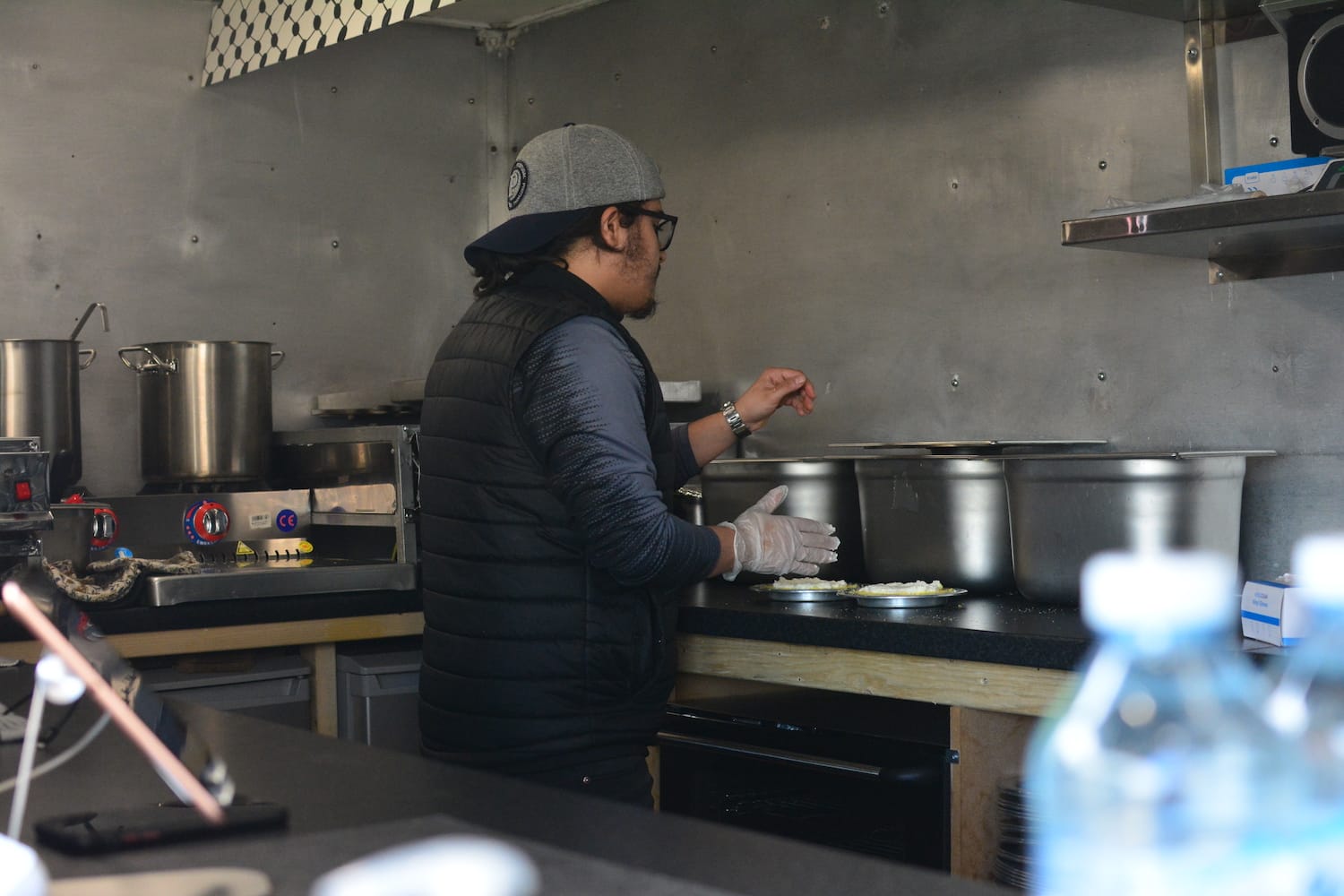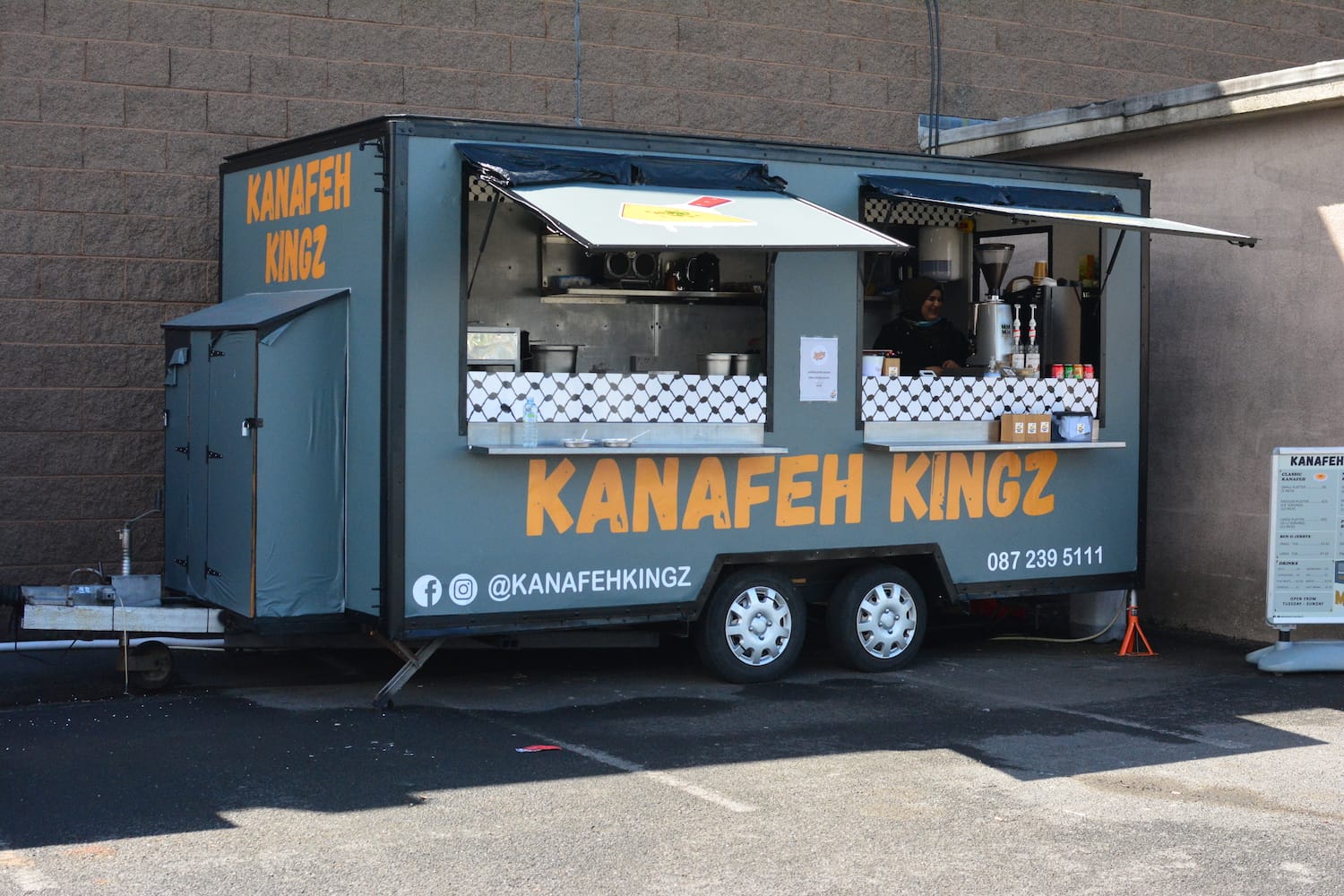What’s the best way to tell area residents about plans for a new asylum shelter nearby?
The government should tell communities directly about plans for new asylum shelters, some activists and politicians say.
Anas Khaled sells kanafeh, a traditional dessert made with delicately baked dough, stringy cheese, and sweetened sugar syrup. Just like his great grandfather.

In the early 20th century, long before Anas Khaled was born, his great grandfather ran a dessert shop in Nablus, a city in the West Bank.
His specialty was kanafeh, the traditional Palestinian dessert made with delicatedly baked dough and stringy cheese, and sweetened with sugar syrup.
In 1947 came the UN vote to partition Palestine, followed by war, and the forced exodus known to Palestinians as “Al Nakba”.
Anas’s great grandfather and his family fled Nablus in fear of their safety, leaving behind their belongings and setting out westward by foot for the Jordanian border.
They lived as refugees in Jordan, moving from place to place. His great grandfather stopped selling kanafeh and passed away soon after the events of 1948.
“It was a family tradition that was cut off because of the Israeli occupation,” says Anas.
Seventy years later, through his business Kanafeh Kingz, Anas, 23 is trying to revive it, selling kanafeh from a renovated food truck in Hibernian Industrial Estate in Tallaght.
Anas and his family moved to Ireland in 2001. But they often go back and visit Jordan, where Anas was born.
Visiting means a chance to enjoy the different Arabic desserts, says Anas.
“I’ve always loved going back home to Jordan, to where my family are having kanafeh, having baklawa,” he says, leaning against the counter of the food truck.
Early in the pandemic last year, while sitting at home in Tallaght, Anas came up with the idea of Kanafeh Kingz.
“It was always just something that was kind of close to my heart, something that connects me back to my country, to my family, to my origins,” Anas says.
“It’s not just an idea out of nowhere, there’s this history to why I’m doing this,” he says.
For Anas, making kanafeh is a way to express his identity as an Irish Palestinian. “This is a way for me of reconnecting my present with my past,” he says. “I’m trying to bring my country to Ireland.”

The importance of Palestinian heritage and culture is reflected in the branding of Kanafeh Kingz.
The façade of the food truck carries a subtle fish-net design, mimicking that of the tradition Palestinian scarf, the keffiyeh.
Rahaf Khaled, Anas’s sister, was more than happy to help her brother with the creative direction of Kanafeh Kingz, she says. She has a background in design.
She holds up a black and white keffiyeh they keep inside the food truck. “That’s where the design comes from,” says Rahaf, 20.
Rahaf wanted to give her brother’s idea more identity, she says, so she linked the design to their past. “It is very meaningful to us.”
Anas spent months working on his kanafeh technique, using an abridged version of his great grandfather’s recipe – his mother and grandmother remembered bits and pieces, Anas says – as a starting point.
He offered free samples to friends and family in exchange for feedback.
Those who tried Anas’s kanafeh early on urged him to keep the dessert as authentic as possible, he says.
Modern iterations of kanafeh have experimented with sauces, toppings and ingredients, but Anas was keen to commit to simplicity.
“What I was trying to do was provide something that was truly Palestinian, as it is, as it originally was,” he says.
Once happy with his recipe, he started taking advance orders, delivering kanafeh around Dublin himself.
“I’ve gotten the feedback of our community here, of different Palestinians, people who have visited Palestine,” Anas says.
He’s been told his kanafeh tastes like Palestine, he says. But “there’s always room for improvement”.
Haya Khaled, another of Anas’s sisters, also works at the food truck. Haya, 25, says that she “usually does not eat kanafeh”, but once her brother started making it, she became addicted to the dessert.
Earlier this year, Anas took six weeks off from making kanafeh and running deliveries, to fix up the food truck and get it ready to serve.
“I know all of my friends on Instagram, they’ve been following this… it looks really good,” said Fatima Ahmed, a first-time customer at the food truck, on a recent Tuesday.
She tried kanafeh once before in Turkey, she says, and was delighted to finally find it here.
Anas presses dough into a small metal plate, before layering on his fresh cheese mixture.
Anas offers two variations of kanafeh, with differing dough. Fine kanafeh is closest to the original Nablusi-style dessert, while coarse kanafeh is made with vermicelli.
The cheese mixture, which he developed himself, replicates the taste of akkawi, which is traditionally used in kanafeh.
Placing the metal plate on a specially-fitted gas cooker, Anas bakes the dough lightly, searching for the desired golden-brown finish. The cheese softens slowly on top.
Satisfied, Anas flips the baked kanafeh before carrying out the final steps. He dribbles sugar syrup and pistachio nuts on the brittle dough. The whole process takes less than 10 minutes.

In Palestine, kanafeh is enjoyed at any time of the day, says Anas. “It could be a breakfast, lunch or dinner.”
It’s also common at celebrations. Two weeks ago, during Eid, Kanafeh Kingz was flat-out all day.
“Especially now, with the lockdown easing as well, the mosques were open, so people were able to gather and celebrate together, which was very very good,” he says.
During Ramadan, Kanafeh Kingz had adjusted its opening hours to cater for those fasting. Some came after dark to drink tea and coffee or to grab a dessert.
Since relaunching Kanafeh Kingz in the new food truck last month, it’s been “slowly gaining more and more awareness”, Anas says. (Before this, he was just doing deliveries.)
“The community has been very, very supportive in a time of need, in a time where people are losing their jobs,” he says.
When pandemic restrictions allow for it, Anas plans to bring his kanafeh elsewhere. “Hopefully, I’m able to tour and explore Ireland.”
He’ll bring more than desserts in his food truck. He hopes to platform his heritage by travelling, speaking to people around the country.
“The majority of Ireland are aware and supportive of Palestine. But it’s great to be able to actually show a glimpse of Palestine, of our desserts, of our history,” he says.
Anas also wants to travel to one place he has never been, to Nablus, the birthplace of kanafeh. “That would be a dream for me.”
He wants to sample kanafeh there, in his home city.
“And, you know, see how they make it, what lessons I can take from them and how I can improve. To bring back the authentic recipe to Ireland,” he says.
Get our latest headlines in one of them, and recommendations for things to do in Dublin in the other.